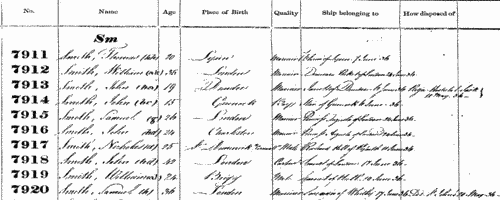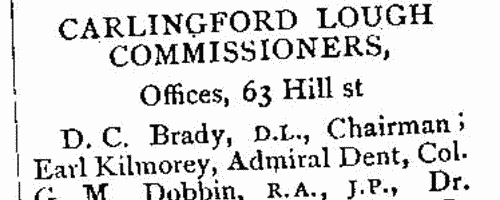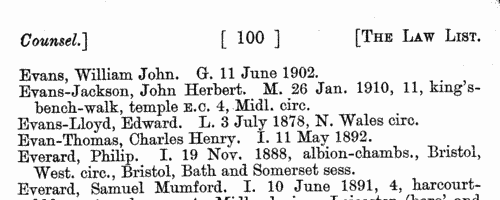Win Surname Ancestry ResultsOur indexes 1000-1999 include entries for the spelling 'win'. In the period you have requested, we have the following 21 records (displaying 11 to 20): Single Surname Subscription | | | Buying all 21 results of this search individually would cost £110.00. But you can have free access to all 21 records for a year, to view, to save and print, for £100. Save £10.00. More... |
These sample scans are from the original record. You will get scans of the full pages or articles where the surname you searched for has been found. Your web browser may prevent the sample windows from opening; in this case please change your browser settings to allow pop-up windows from this site. Tradesmen of York
(1559-1759)
No man or woman could trade in the city of York without having obtained 'freedom' of the city. Their names were recorded on the 'Freemen's Roll', or Register of the Freemen of the City of York, which contains about 16,600 names for this period. A list of names was prepared for each year. Each annual list starts with the name of the mayor and the camerarii or chamberlains. The chamberlains were freemen charged with the duty of receiving the fees of the new freemen; of seeing that only freemen traded in the city; and of preparing this roll, which was compiled from the names on their own account books from the receipts for the fees. There are three groups of freemen: those who obtained freedom after serving out an apprenticeship to a freeman; the children of freemen (per patres); and a handful who claimed freedom by 'redemption', i. e. by purchase or gift from the Mayor and Court of Aldermen.
WIN. Cost: £2.00.  | Sample scan, click to enlarge

| Merchants and traders in Newcastle-upon-Tyne
(1480-1770)
The society of Merchant Adventurers of Newcastle-upon-Tyne consisted of those who had obtained freedom of the city (allowing them to trade there) by birth as a son of, or apprenticeship, to a freeman: and within that, freedom of one of the three 'trades', i. e. boothman, draper or mercer. F. W. Dendy prepared extracts from the merchant adventurers' records, the first volume, published by the Surtees Society in 1895, containing extracts from the ordinances of the society through to 1894, the great majority being, however, from the 16th to 18th centuries. The Merchants' Company was founded with a series of enactments for their guidance and governance. But Dendy remarks that "Experience soon convinced them of the need of other laws, and these were framed from time to time. But during a very considerable period the members of the Society seem to have been influenced by a love of legislating, and their bye-laws increased to an unnecessary and perplexing extent." Indeed, many of the later ordinances amount to no more than minutes of particular orders aimed at particular people. WIN. Cost: £4.00.  | Sample scan, click to enlarge

| Tradesmen of Chester
(1392-1805)
Lists of admissions of freemen of the city of Chester from the earliest surviving records to 1805 were compiled by J. H. E. Bennett and published by the Lancashire and Cheshire Record Society from 1906. These lists were extracted from the mayoral yearbooks (dating back to 1392) and twelve freemen's rolls covering 1538 to 1612 and 1636 to 1805; and a list of admissions for 1505-1506 in Harleian MS 2105 (British Library). The record does not become more or less continuous until about 1490: in all, 12,426 freedoms are recorded. Freedom of the city, necessary to practise a trade in the city, could be obtained by birth (in which case the father's name and occupation are usually given); by apprenticeship to a freeman (the master's name and occupation being given); or by order of assembly. Both the freemen and the masters listed are indexed here. The main abbreviations used are: B, freedom taken up by right of birth; I, freedom taken up by right of indenture; M. B., Mayor's Book; *, freedom granted by order of assembly.WIN. Cost: £4.00.  | Sample scan, click to enlarge

| Buckinghamshire Freeholders: Aylesbury
(1831)
The poll of the freeholders of Buckinghamshire at the election of two knights of the shire to serve in Parliament, taken at Aylesbury 5, 6, 7 and 9 May 1831. The candidates were the Marquis of Chandos, John Smith esquire, and Pascoe Grenfell esquire. This poll book sets out the names of the voters in alphabetical order hundred by hundred and parish by parish. The freeholders' full names are stated, surname first, and the place of their abode (often elsewhere). The right hand column records their votes. The qualification for suffrage in the counties was the possession of a freehold estate worth more than 40s a year. The section for Aylesbury includes Walton.WIN. Cost: £6.00.  | Sample scan, click to enlarge

|  British merchant seamen
(1835-1836) British merchant seamen
(1835-1836)
At this period, the foreign trade of ships plying to and from the British isles involved about 150,000 men on 15,000 ships; and the coasting trade about a quarter as many more. A large proportion of the seamen on these ships were British subjects, and so liable to be pressed for service in the Royal Navy; but there was no general register by which to identify them, so in 1835 parliament passed a Merchant Seamen's Registration Bill. Under this act this large register of British seamen was compiled, based on ships' crew lists gathered in British and Irish ports, and passed up to the registry in London. Each seaman was assigned a number, and the names were arranged in the register by first two letters of the surname (our sample scan shows one of the pages for 'Sm'); in addition, an attempt was made to separate out namesakes by giving the first instance of a name (a), the second (b), and so on. But no effective method was devised to prevent the same man being registered twice as he appeared in a second crew list; moreover, the original crew lists were clearly difficult for the registry clerks to copy, and some of the surname spellings appear to be corrupted. A parliamentary committee decided that the system devised did not answer the original problem, and this register was abandoned after less than two years: but it is an apparently comprehensive source for British merchant seamen in 1835 to 1836. The register records the number assigned to each man; his name; age; birthplace; quality (master, captain, mate, 2nd mate, mariner, seaman, fisherman, cook, carpenter, boy &c.); and the name and home port of his ship, with the date of the crew list (usually at the end of a voyage). Most of the men recorded were born in the British Isles, but not all (for instance, Charleston and Stockholm appear in the sample scan). The final column 'How disposed of' is rarely used, and indicates those instances where a man died, was discharged, or deserted his ship during the voyage.WIN. Cost: £8.00.  | Sample scan, click to enlarge

| Mariners' Church Donations
(1845)
Each monthly issue of The Mariners' Church Soldiers' and Sailors' Gospel Temperance Magazine, published by the Temperance British and Foreign Seamen's, Soldiers' and Steamers' Friend Society, and Bethel Flag Union, to promote religious instruction and temperance moral reformation and general unsectarian missions in the British Empire, at home and abroad, contained a section of Acknowledgments of sums contributed by individuals or through the Bethel churches to the society's funds, and in support of the orphan home. WIN. Cost: £6.00.  | Sample scan, click to enlarge

| Inhabitants of Comber in county Down
(1886)
George Henry Bassett's County Down Guide and Directory aimed to be 'A book for Manufacturers, Merchants, Traders, Land-Owners, Farmers, Tourists, Anglers, and Sportsmen generally.' It is a good general directory, listing gentry, tradesmen and farmers. (The sample scan is from the introduction).
WIN. Cost: £6.00.  | Sample scan, click to enlarge

| Naturalized Aliens
(1912)
The Home Office issued a monthly list of aliens to whom Certificates of Naturalization (or of Readmission to British Nationality) had been granted by the Secretary of State, and whose oaths of allegiance had been registered. The lists are arranged alphabetically by surname and forename; then give country of origin, date of taking oath of allegiance, and place of residence. This is the list issued in October 1912 of those naturalized in September 1912.WIN. Cost: £4.00.  | Sample scan, click to enlarge

| Barristers
(1918)
The Law List for 1918 includes this 'List of Counsel, Special Pleaders, and Conveyancers at the Bar'. Each name is given in full, surname first; then the name of the Inn of Court as an abbreviation (G., Gray's Inn; I., Inner Temple; L., Lincoln's Inn; M., Middle Temple; and D. C. for Doctors' Commons) and date at which called to the bar. Barristers in practice are usually furnished with an address, and there are some abbreviated references to judicial awards and appointments. An asterisk signifies an Equity Draughtsman and Conveyancer.WIN. Cost: £4.00.  | Sample scan, click to enlarge

| London Telephone Subscribers
(1939)
The London telephone directory lists subscribers alphabetically by surname and then by christian name or initials, with their postal address and telephone number. This is the L to Z directory issued in May 1939, but also contains some names from earlier in the alphabet, for instance in the separate section for midwives. The London telephone districts comprised not only the city centre, but also the very extensive suburbs in the Home Counties (Essex, Kent, Surrey and Middlesex).WIN. Cost: £4.00.  | Sample scan, click to enlarge

|
Research your ancestry, family history, genealogy and one-name study by direct access to original records and archives indexed by surname.
|













